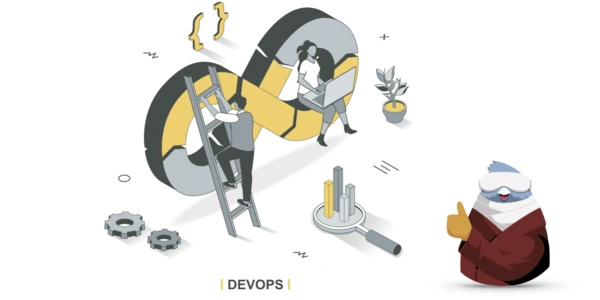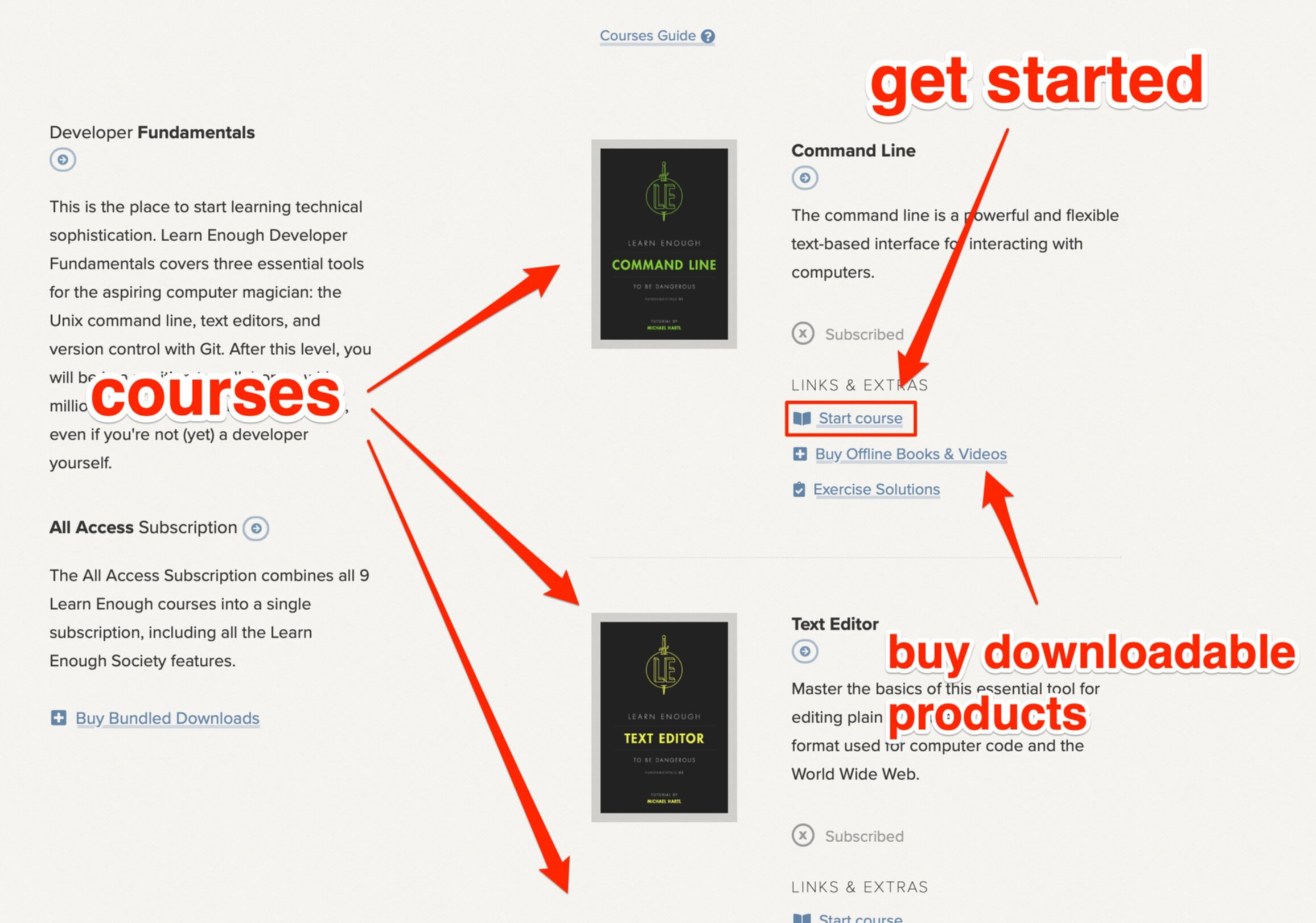
Devops Learning Roadmap 2024: 14 Foundational Skills
Are you dreaming dreams of devops mastery?
Whether you're an individual looking to build a robust foundational skill set or a team leader hoping to guide your team into devops, the roadmap can initially seem somewhat misted over.
That's where Learn Enough's 14-course foundational skills training comes in.
Designed to equip you with essential skills, this comprehensive program is the perfect launchpad for solo professionals and teams eager to dive into devops.
In this piece, we'll introduce you to our 14-course plan and unpack its value as an integral first lap on your devops learning journey.
What is devops?
Devops is a shift that connects traditionally siloed teams, including development and operations teams, characterized by a marked cultural focus on increased collaboration and interdisciplinary exchange.
It's a methodology—a way of life in software development and engineering that allows faster, more efficient development and deployment cycles.
Devops teams and devops engineers are about collaboration, resulting in shorter development cycles, increased deployment frequency, more dependable releases, and quicker time to market.
For more insight, watch the following video by Rackspace Technology.
In the explosive landscape of 2024, devops has established its place as a practice that accelerates innovation, improves software quality and system performance, and, ultimately, offers a superior experience for end-users.
Foundational skills, like the ones offered in Learn Enough's 14-course team program, are essential to successfully adopting this holistic approach. For organizations looking to put these skills into practice, OpSourced offers expert DevOps services, from managed platforms to infrastructure automation, helping streamline adoption and maximize performance
Dev teams vs. devops teams: What's the difference?
Traditional software development models often have development and operations teams working separately, which can lead to inefficiencies due to miscommunication, delays, and a lack of understanding of each other's roles.
Developers focus on writing code and creating software, while operations teams handle deployment and infrastructure management.
The devops model seeks to bridge this gap by integrating the roles of development and operations into a unified process.
This model encourages continuous collaboration and communication between dev and ops, resulting in a more efficient workflow, faster deployment times, and improved software quality.
Devops engineers or teams often use practices like continuous integration, continuous delivery/deployment, infrastructure as code, and proactive monitoring to ensure that the software development lifecycle is as smooth and efficient as possible.
Learn Enough's Team Licence ensures all team members have a shared foundational skill set, which aligns well with the DevOps philosophy.
This approach can foster better collaboration, innovation, and problem-solving by ensuring everyone has a common understanding and can work together more effectively.

What are the benefits of devops teams?
While devops initially stemmed from the need for smoother software development processes, its benefits extend beyond mere efficiency.
Organizations can opt for Devops foundation certification for their teams, enabling them to learn collaborative practices and tools to enhance software development efficiency. This certification fosters faster releases and improved software quality, driving business success through streamlined processes.
Devops creates a culture change that can lead to transformative improvements for organizations. Here are some key benefits that devops teams bring to the table:
Improved Collaboration and Communication: By breaking down silos and fostering a culture of shared responsibility, devops encourages smoother, more effective communication and collaboration within teams. This improved synergy often leads to more innovative solutions and a more enjoyable working environment.
Faster Time to Market: With devops, the gap between creativity and deployment shrinks significantly. Continuous integration, delivery, and automated testing make the development cycle faster and more efficient, leading to quicker releases.
Increased Efficiency: Devops practices such as automation, continuous delivery, and the use of cloud platforms can significantly increase efficiency, allowing teams to focus more on creating new features and less on dealing with the logistics of release and maintenance.
Enhanced Quality and Performance: As a byproduct of close collaboration, automation, and continuous feedback, devops typically leads to fewer bugs and issues, enhancing the quality of the product and improving the overall user experience.
Better Problem-solving: devops encourages a shift from reactive problem-solving to a proactive approach. The collaborative culture, combined with continuous monitoring and logging practices, allows teams to identify and address issues before they become significant problems.
Reduced Risk: By implementing practices like automated compliance policies, configuration management, SCIM provisioning, and continuous feedback, as well as using data mapping software devops can significantly reduce the risk of failures and security breaches.
In addition to mastering the various tools and practices essential for DevOps, understanding the intricacies of cloud risk assessment can significantly enhance your team's security posture and ensure the resilience of your cloud infrastructure.
Adopting devops can lead to a virtuous cycle of continuous improvement. Utilizing customer feedback services will further drive a culture of high performance that extends beyond the IT teams to benefit the entire organization's performance metrics.
With the shared foundational skills provided by Learn Enough's Team License, you can start building this devops culture within your team today.
The power of foundational devops skills
As the old saying goes, "You can't build a great building on a weak foundation." The same holds for devops.
Building a high-performing devops team begins with establishing solid foundational skills. These foundational skills serve as the cornerstone of devops and shape the team's culture, effectiveness, and efficiency.
Let's venture deeper into the power of foundational devops skills.
The key to mastering solo devops
Solo devops, while less common, is indeed a thing.
It often refers to individuals who manage multiple aspects of the development lifecycle, often in smaller teams or startups. In these scenarios, a solo devops engineer or practitioner must often wear multiple hats—from coding to testing, deployment, and infrastructure management.
However, this kind of multi-faceted role is only possible with diverse skills. The strength of a solo devops professional lies in their versatility.
This is where foundational skills come in, and where individuals can benefit from Learn Enough's All-Access Subscription, which features the same essential courses as the team option.
Acquiring a broad knowledge base across diverse areas—from the various operating systems, system, administration, and network fundamentals to scripting and coding—enables one to navigate the complexity of managing the entire devops lifecycle independently.

Building stronger teams with devops
The potency of foundational devops skills lies in their ability to break down silos, drive collaboration, and foster a culture of continuous learning and improvement.
Whether you're a solo professional aiming to master devops or a team leader looking to strengthen your team, the 14-course foundational skills training provided by Learn Enough is a great place to start your devops journey.
The proficiency in multiple languages, technical expertise, and a rich array of baseline training for devops establishes a standard of technical competence that's necessary for various roles, whilst fostering a mutual understanding of common programming languages among the team.
For serious insight into the intricacies of devops, which do go far deeper than the beginner-roadmap that we provide, watch the following video by Cloud Champ.
This pivotal step can bridge the gap between team members, resulting in an environment that encourages collaboration and a complete absence of silos.
Moreover, these foundational skills provide the substrate for the culture of perpetual learning, which is a cornerstone of successful devops teams. In a rapidly evolving DevOps landscape, the ability to consistently acquire new skills and update existing ones is fundamental.
This not only ensures teams remain on the cutting edge of technology but also drives innovation within the organization.
Further, possessing diverse foundational skills equips teams with greater resilience and adaptability. When confronted with novel technologies or shifts in business scenarios, a team armed with a broad set of skills is better prepared to adjust and devise effective solutions.

Your 14-step foundational devops roadmap from Learn Enough
Learn Enough has compiled a comprehensive devops roadmap, for your journey into devops. This 14-course program has been carefully curated to provide a balanced mix of skills, networking concepts, and knowledge.
Each course in this roadmap adds a unique piece to the devops puzzle, contributing to your competence and confidence in handling real-world devops challenges.
1. Learn Enough Command Line to Be Dangerous: The first step to your devops journey
The command line is the nerve center of a devops engineer's operating systems and's toolkit. This course is designed to acquaint you with the command-line interface (CLI), a fundamental tool for any system administrator, devops engineer, or professional developer.
The course covers essential command-line concepts and tasks, such as file manipulation, directories, and system and configuration management tools, which are essential for controlling infrastructure monitoring and automating your devops environment.
For DevOps professionals, an essential aspect of optimizing the development cycle is employing efficient real-time application performance monitoring. This approach not only aids in identifying potential issues before they escalate but also enhances the overall resilience of the applications being developed.
2. Learn Enough Text Editor to Be Dangerous: Simplifying the development process
A text editor is essential in any developer's arsenal, especially in devops, where quick and efficient code editing can make all the difference.
This course teaches you how to master different text editors, discover advanced editing features, and streamline your coding process to increase productivity.
3. Learn Enough Git to Be Dangerous: Embrace efficient version control
Git is the go-to version control system for many devops teams. It allows for collaborative development and keeps track of all changes in the same source code base.
This course will guide you through the intricacies of Git, providing the know-how to effectively manage and track your codebase's evolution and ensure smooth deployment of updates.
4. Learn Enough HTML to Be Dangerous: Building the Skeleton of the Web
HTML is the building block of any website.
Devops teams often work closely with web-based applications, and having a good understanding of HTML can facilitate effective communication between team members and improve web application deployment and performance.
5. Learn Enough CSS & Layout to Be Dangerous: Sprucing up the Web
CSS complements HTML by providing style and layout to web pages.
In devops, understanding CSS can help you optimize web application interfaces for usability and efficiency, enhance user experience, and reduce web server and load.
6. Learn Enough Python to Be Dangerous: Script your success in web development
Python is a strong programming language used for web dev, machine learning, cloud computing or even automating daily tasks.
As a devops professional, Python knowledge helps you automate repetitive tasks and create efficient workflows.
7. Learn Enough JavaScript to Be Dangerous: Bringing Interactivity to your web pages
JavaScript powers the interactive elements of most websites. It's essential for creating dynamic and interactive web applications.
For devops teams, knowledge of JavaScript can aid in front-end development, debugging, and improving website functionality.
8. Learn Enough Ruby to Be Dangerous: Powering robust backend development
Ruby is a powerful, object-oriented language often used for backend development. It's known for its elegance and readability.
Understanding Ruby in a devops context is beneficial for server-side scripting and driving the business logic of web applications.
9. Ruby on Rails Tutorial (Rails 5): Evolve with the Rails framework
Rails 5 is a robust framework for building web applications. This course covers the essentials of Rails and builds a solid foundation for creating complex, data-driven web applications.
Devops teams can benefit from understanding how Rails applications are structured and how they interact with databases.
10. Ruby on Rails Tutorial (Rails 6): Staying updated with Rails advancements
Rails 6 introduces new features that make developing web applications even more streamlined.
For devops, staying updated on the latest technologies is crucial for efficiency and performance optimization.
11. Ruby on Rails Tutorial (Rails 7): Keeping pace with Rails evolution
Rails 7 offers further enhancements and improvements. This course will provide the necessary updates and ensure your skills stay relevant.
In devops, continuous learning is vital to staying competitive and maintaining high performance.
12. Learn Enough Action Cable to Be Dangerous: Crafting real-time web applications
Action Cable integrates WebSockets with the rest of your Rails application.
For devops engineers, understanding Action Cable can contribute to creating highly interactive and dynamic web applications.
13. Learn Enough Dev Environment to Be Dangerous: Set the stage for successful coding
A well-configured development environment is critical for efficient coding and deployment processes. This course covers the essential tools and configurations of the production environment needed.
For devops professionals, mastering the setup and configuration of development environments can lead to a smoother and more efficient development pipeline.
14. Learn Enough Custom Domains to Be Dangerous: Carving your own space on the Web
Custom domains give your web applications a professional and unique web presence. This course provides the knowledge to acquire and configure custom domains and web servers.
In devops, understanding how to set up and manage custom domains and cloud services like desktop-as-a-service is essential for the deployment and accessibility of web applications.
Each course in this roadmap adds another layer to your devops skillset, expanding your knowledge and abilities and paving the way for a successful devops and career path. Whether you're a solo professional or part of a team, Learn Enough's 14-course program is the ideal foundation for your devops journey.

In Conclusion
Embracing devops is a transformative journey that can revolutionize how you and your team manage development and operations.
The foundational skills we've discussed can empower professionals and teams alike, breaking down silos and nourishing continuous learning and an innovation culture.
Foundational coding and operations skills are the bedrock upon which a thriving devops culture can be built.
Whether mastering the command line, learning the intricacies of Git, or diving deep into HTML, CSS, Python, and beyond—each skill adds another string to your devops bow, preparing you to face the challenges of integrating development and operations.
Let's remember that in the realm of devops, the team is paramount. Shared and varied coding, programming languages, and IT skillsets pave the way for dynamic collaboration, promoting a seamless exchange of ideas and spurring innovation.
In such an environment, problems are solved more efficiently, ideas are realized faster, and the end product is always a testament to collective effort.
At Learn Enough, we are committed to helping you set off on the right foot on your devops journey. Our All-Access Subscription is designed to arm you with all the necessary foundational knowledge and skills to make a mark in devops.
For teams, our comprehensive Team License provides access to all 14 courses, providing a well-rounded, foundational training program that can empower your team and optimize your devops practices.
Explore our course list today and take the first step toward a future in devops.
Frequently asked questions
What is a DevOps learning roadmap?
A DevOps learning roadmap is a guide that outlines the skills and knowledge you need to become a DevOps engineer. This can include understanding of various tools and practices related to software development, IT operations, automation, containerization, cloud computing, and more.
How can I start learning DevOps?
You can start learning DevOps by first understanding the fundamentals of software development and IT operations. This includes learning a programming language, understanding operating systems, and getting familiar with networking and security protocols.
Online platforms like Learn Enough can provide you with the foundational coding skills needed to start your DevOps journey.
What skills do I need to become a DevOps engineer?
To become a DevOps engineer, you need a mix of technical and soft skills. Technical skills include knowledge of programming languages, understanding of software development and IT operations, experience with automation tools, familiarity with cloud platforms, and understanding of containerization technologies.
Soft skills include problem-solving abilities, good communication skills, and the ability to work well in a team.
What are the steps in a DevOps learning roadmap?
A typical DevOps learning roadmap might include the following steps:
Learn the fundamentals of programming. You can start with an online course on Learn Enough.
Understand the basics of operating systems and networking.
Learn about version control systems like Git.
Get familiar with automation tools and practices.
Learn about containerization technologies like Docker.
Understand cloud computing and get hands-on experience with a cloud platform.
Learn about continuous integration and continuous deployment (CI/CD) practices.
Understand infrastructure as code (IaC) and configuration management tools.
Are there online resources for learning DevOps?
Yes, there are many online resources for learning DevOps. This includes online courses, tutorials, blogs, and forums. Websites like Learn Enough offer courses that can help you learn the coding skills needed for DevOps.
There are also many great resources on platforms like GitHub, where you can find learning roadmaps and other educational content.
All Access Subscription
Get free access to all 10 Learn Enough courses (including the Ruby on Rails Tutorial) for 7 days!
Free 7 Day trial details
We require a credit card for security purposes, but it will not be charged during the trial period. After 7 days, you will be enrolled automatically in the monthly All Access subscription.
BUT you can cancel any time and still get the rest of the 7 days for free!
All Learn Enough tutorials come with a 60-day 100% money-back guarantee.











